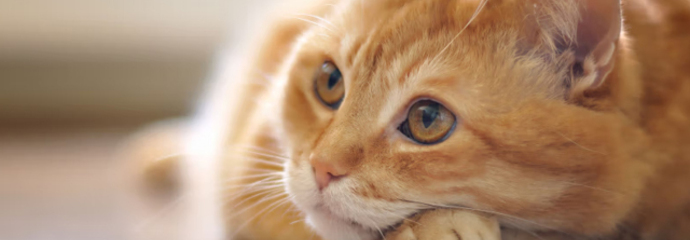Cats

How to Help Cats Maintain a Healthy Weight
Did you know that approximately 35 to 40 percent of all cats seen by veterinarians in the United States are overweight or obese? This means that almost half of the 88.6 million cats that receive veterinary care in the United States are not at a healthy weight.
Overweight cats, even those with two to three extra pounds, tend to be less active, experience joint pain, lose the beauty of a soft, silky coat because of an inability to groom and develop more skin conditions. They are also four times more likely to develop diabetes mellitus Type 2 compared to lean cats. At Purina, we believe feeding your cat to maintain an appropriate weight will provide positive health benefits, helping them live a long, healthy life.
A change in diet and feeding practices, along with even slight increases in activity, can help with weight loss. Our scientists have been studying the different factors, including diet, environment and behavior, that help cats maintain a healthy weight. Their studies have led to the development of two new formulas that will help owners and their cats reach the goal of a healthier weight:
Purina® Cat Chow® Healthy Weight dry cat food and Purina ONE® SMARTBLEND® Healthy Metabolism™dry and wet cat foods.
Here’s a look of the science behind each formula:
Purina® Cat Chow® Healthy Weight
This formula is high in protein, promoting a feeling of fullness and satisfaction, and in some cats, a longer period of time between feedings. While traditional weight loss diets tend to be low in fat and high in fiber, our Healthy Weight formula contains higher levels of protein to support the weight loss process. This high protein, lower carbohydrate formula helps cats lose weight while maintaining lean body mass, which is very important during weight loss. Higher levels of protein have been shown to help cats lose body weight and fat mass, helping your cat slowly and safely get back to the healthy weight he or she was meant to be.
Get the facts on obesity and cats.
Purina ONE® SmartBlend® Healthy Metabolism™
This formula uniquely targets the metabolic needs of cats that have been spayed or neutered. While spaying or neutering is a healthy and responsible choice, it causes a decrease in hormone levels, translating to a decreased metabolism and subsequent weight gain. Our Healthy Metabolism™ formulas contain a minimum of 42% protein, which is higher than any of our other Purina ONE® cat food dry formulas. Combined with lower levels of fat and carbohydrate, this high protein formula helps boost a cat’s metabolism, so they can lose weight while retaining lean muscle mass. This formula also contains L-Carnitine, which helps the body convert fat into energy.
Purina ONE® SmartBlend® Healthy Metabolism™ comes in both dry and wet formulas, and can be fed in combination to provide variety while maintaining the journey to a healthy weight.
Learn more about our Healthy Metabolism™ formula.
These new formulas are specially designed to help cats lose weight in a safe manner while allowing them to feel fuller, longer. The development of these diets is just one more way we are using our nutritional expertise to help cats live a long, healthy life.
